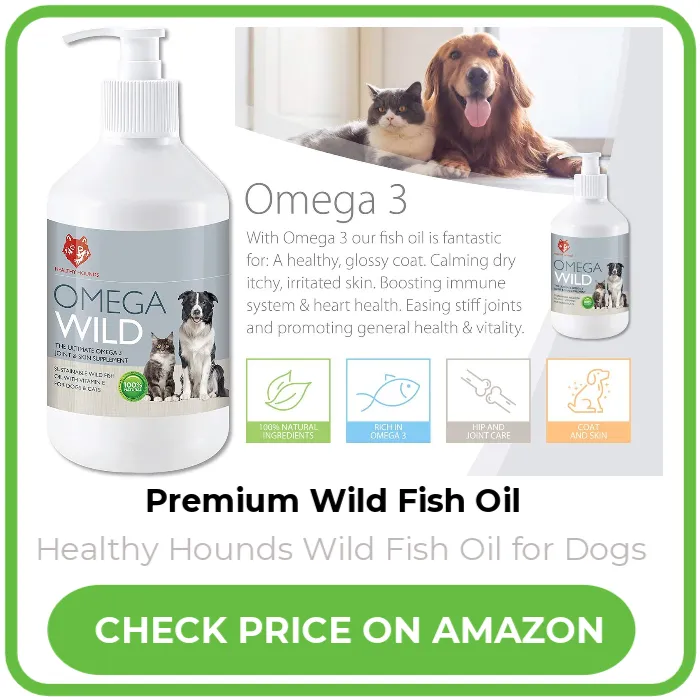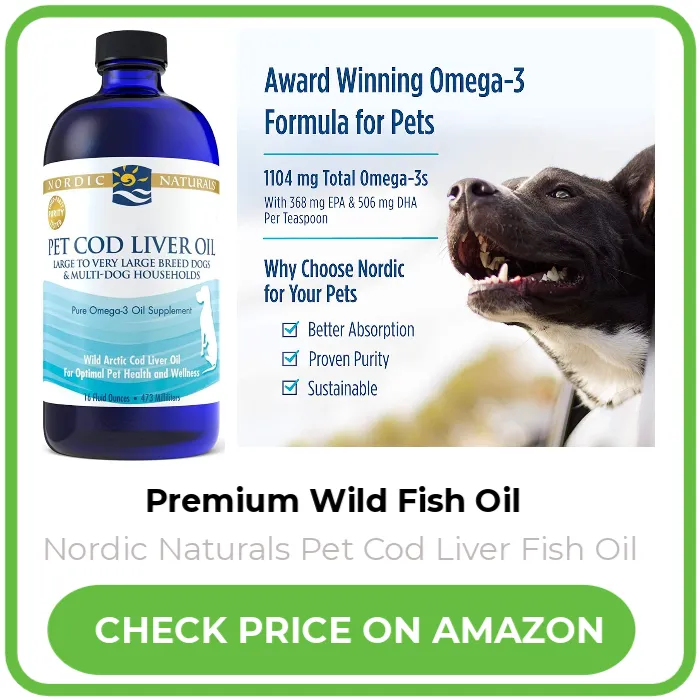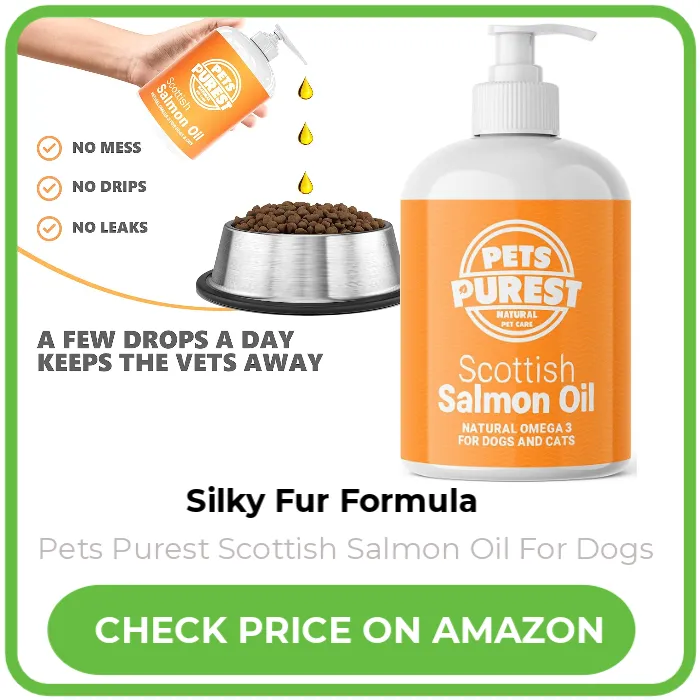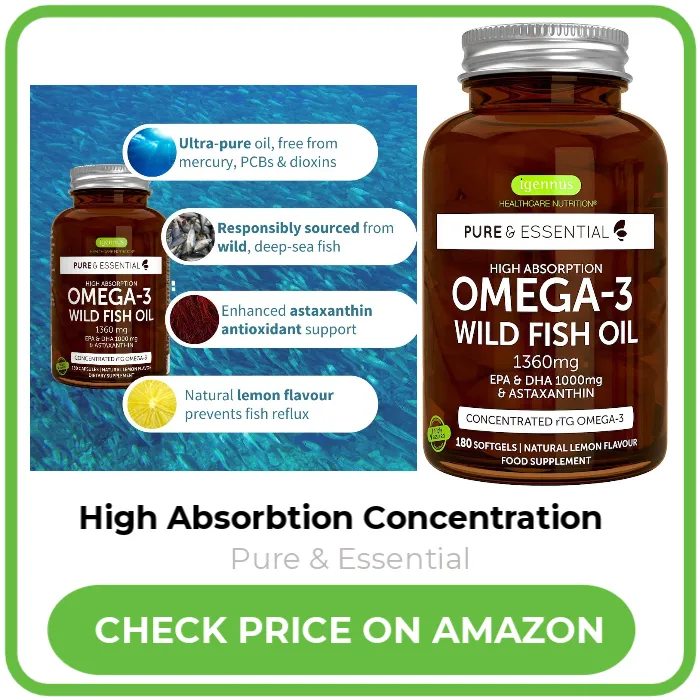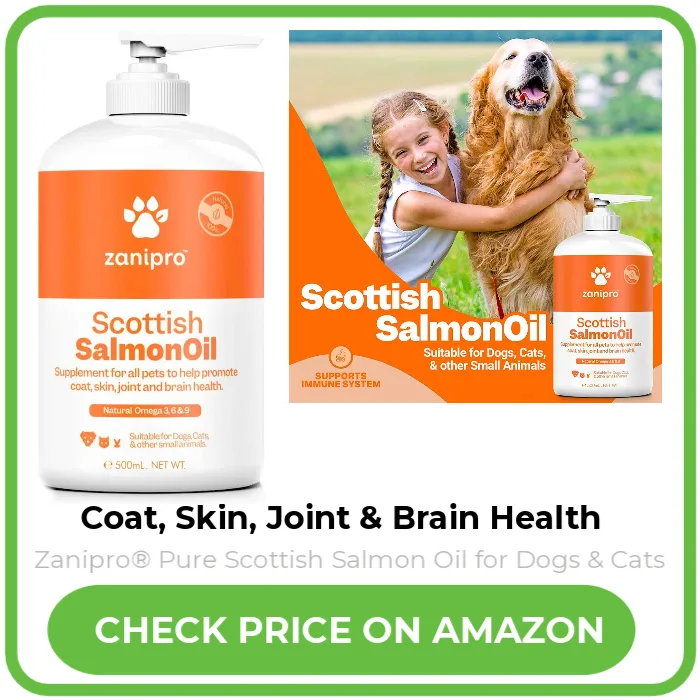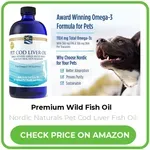Fish Oil For Dogs
Best fish oil supplement for Dogs
In this post, we describe the best fish oil for dogs, the health benefits of fish oil for dogs and what brands of fish oil are available for dogs.
We will provide you with some tips on how to select the best fish oil for your dog, as well as what you should be looking for when buying fish oil for your pets.
If you’re looking for the best fish oil for your dog, then it may seem like a very confusing topic, given all the different types of fish oil out there.
There are a few things to consider - like what exactly is fish oil, what are the advantages of fish oil, what it looks like, how much you give your dog, and what are some of the side effects.
That’s why, in this article, I’m going to provide you with everything you need to know about the best fish oil for dogs.
And if you’re wondering what fish oil is - and whether you should give it to your dog, then let’s take a closer look at fish oil.
These Top 8 make our Top Selection List:
How we choose:
We've read through & researched countless reviews on Amazon and other Authoritative Sources and Researched Data to find some of the best of the best Fish Oil supplements for immune support, muscle strength, muscle recovery, athletic endurance and sleep for your dog.
Why Buddy & Lola 100% Pure Food Grade Scottish Salmon Oil For Dogs & Pets
Made Our Best of The Best Top 8 & Why we love it
It is helpful & reassuring to know
You can trust a UK brand with 100% SATISFACTION GUARANTEE. With their leading money back guarantee, they will back every purchase so that you can be sure you are getting the highest quality supplement. If your dog is not completely satisfied, you can contact them for a full refund. No questions asked at all.
Why SuperSelf Fish Oil Omega 3 Capsules
Made Our Best of The Best Top 8 & Why we love it
Each serving of SuperSelf Omega 3 supplements contains 3000mg of fish oil, which is double the amount of fish oil in a single serving. 120 capsules are contained in each package. The softgels are easy to swallow, do not cause burping, and do not cause an upset stomach.
It is helpful & reassuring to know
Scientifically developed and manufactured in the UK, SuperSelf fish oil omega 3 supplement has high quality built-in. Good Manufacturing Practice standards are used to make the products and they are tested by independent laboratories for purity and potency. It's a good idea to shop with confidence and know that these products are safe.
Why Healthy Hounds Wild Fish Oil for Dogs
Made Our Best of The Best Top 8 & Why we love it
Our wild fish oil has high levels of EPA and DHA, making it the best for your fur babies. Omega 3 is more important for dogs than salmon oil. Perfect for Joint and Hip Health: The high levels of EPA in this fish oil provide a greater level of support for joints and hips, which will helps to support in the reduction of inflammation and joint stiffness, as well as joint pain.
If you want to see your pet's healthiest coat, look for the Healthy Hounds Wild Fish Oil that is designed to soothe dry or itchy skin and dander. It is possible to reduce moulting and shed for a silky soft coat.
It is helpful & reassuring to know
Why Nordic Naturals Pet Cod Liver Oil
Made Our Best of The Best Top 8 & Why we love it
It is helpful & reassuring to know
Why Pets Purest Scottish Salmon Oil For Dogs
Made Our Best of The Best Top 8 & Why we love it
It is helpful & reassuring to know
Why Pure & Essential High Absorption Omega-3 Wild Fish Oil
Made Our Best of The Best Top 8 & Why we love it
High absorption is achieved by using the most advanced form of Omega 3, re-esterified triglyceride, which raises levels of EPA and DHA in cells 3.5 times more than standard fish oil.
Wild fish oil is carefully selected to remove environmental toxins and independently tested.
It is helpful & reassuring to know
NO FISHY TASTE - natural lemon flavour ensures no fishy odour or fishy burps, GMP manufactured in the UK, non GMO
Why Pawbits Wild Fish Oil
Made Our Best of The Best Top 8 & Why we love it
It is helpful & reassuring to know
Why Zanipro® Pure 1 Litre Scottish Salmon Oil
for Dogs & Cats
Made Our Best of The Best Top 8 & Why we love it
ZANIPRO™ is rich in essential fats, which help maintain a healthy skin and coat for dogs and cats.
Scottish Deep Sea Salmon oil is rich in essential fatty acids, including DHA and EPA, as well as Omega 6 and 9 fatty acids, for a balanced mix that supports the health of both dogs and cats.
It is helpful & reassuring to know
Benefits of Fish Oil for Dogs
fish oil is good for dogs. Many people take fish oil for its support in heart-health advantages, but they do not realize the many other advantages that this oil can provide to them and their pets. Here are some of the most important advantages of fish oil for dogs.
1. It boosts and supports the immune system. It protects your dog from infection. The omega-3, contained in fish oil can help the immune system by fighting infections that can cause your dog's body to become weak.
2. It reduces inflammation. Fish oil helps to support the reduction of inflammation in the body and can protect your dog from various conditions that may be caused by inflammation.
3. It can support skin, fur, joints, and overall and keep your dog's skin healthy. fish oil can keep your dog's skin moisturized. Keeping the skin healthy, will prevent skin disorders and conditions such as dry and oily skin, dermatitis, and eczema.
4. It can help to support and treat arthritis. Fish oil has anti-inflammatory properties. This property can reduce pain, swelling, and inflammation in joints. This can be very helpful for older dogs who suffer from arthritis.
5. It can help to support and treat joint problems. Fish oil can also help to relieve joint pain. Fish oil can also help to fight inflammation in the joints, which is why it is often used for arthritis treatment.
6. It can help support to fight against coronary disease. By reducing the bad cholesterol in your dog's blood, fish oil can help to lower the risk of coronary disease in your dog.
7. It can reduce allergies. Fish oil can help to relieve allergies in your dog. fish oil can help to balance out your
Salmon Oil is the only source of Omega 3 It is the perfect ingredient to use in your dog's daily diet.
Salmon is loaded with nutriment that our bodies need. salmon have a higher concentration of omega-3, protein, vitamin D, and iron. It's beneficial for your dog to consume salmon as part of a good diet.
The first question you should ask yourself is, "Is salmon oil really good for my dog?" Research has found that salmon oil contains omega-3 which are essential to the body. However, not all salmon oil is created equal. There are many factors that can affect the quality of the oil, including the source of the salmon.
You’ll want to select an oil that contains high-quality Omega-3s, as well as a natural source of EPA and DHA. Here are a few things to keep in mind as you shop for your pet’s fish oil
What to look for in a fish oil supplement for your breed of dog?
Look for a fish oil that contains high-quality Omega-3s, as well as a natural source of EPA and DHA. It’s important to look for fish oils that are free of artificial colors, flavors, preservatives, and dyes. You’ll also want to look for a nutrient that doesn’t contain mercury, which can cause serious well-being problems.
Most fish oil are derived from a variety of fish species that are generally high in EPA and DHA, omega-3. However, there are some types of fish that are more concentrated in certain nutriment and are better choices than others. These include herring, salmon, anchovies, and mackerel.
The best fish oils for your breed of dog or puppy will contain at least 3 grams of EPA and DHA per serving, and typically contain up to 10 grams. However, if you’re shopping around, keep an eye on the percentage of EPA and DHA to ensure your oil contains the proper balance. While supplements are not regulated by the FDA, manufacturers must provide certain information about their products. The label should indicate the EPA and DHA content of each dose, and if the label states “fish oil,” the content should be in gram or milligram amounts.
If the item contains less than 3 grams of EPA and DHA, it should state this on the label. If the product has more than 3 grams of EPA and DHA, but less than 10 grams, it should list the EPA and DHA content.
What is Fish Oil?
Fish oil is a fluid-like substance that comes from the blubber of oily fish such as herring, salmon, and mackerel.
Fish oil is a dietary nutrient that helps support a dog's heart, joints, coats, skin, and immune systems.
The oil has been shown to support cardiovascular function, aid in brain function, and may improve joint function in some people. Fish oil is considered a healthy fat because it is rich in EPA and DHA. These fats can be found in large amounts in fish, which is why fish oil is often referred to as “fish oil.”
Source: “Fish Oil for Dogs,” PetMD.com, May 24, 2018, https://www.petmd.com/dog-health-and-wellness/fish-oil-for-dogs/.
The active ingredient in fish oil is EPA (eicosapentaenoic acid) and DHA (docosahexaenoic acid). Both are omega-3, which are essential nutriment for dogs and puppies.
The body cannot synthesize these nutrients; therefore, they must come from foods such as fish and fish oil.
Dogs can benefit from consuming fish oils by receiving the necessary nutritional support and helping to improve their skin and coat conditions.
There are several fish oil for your breed of dog available on the market. You’ll want to look for a quality fish oil that has been clinically tested to ensure that it delivers optimal nutrition to your dog or puppy.
Why Give Your breed of Dog Fish Oil?
- Improved skin and coat well-being
- Improved joint well-being
- Improved brain function
- Increased energy
- Improved mood
- Improved heart well-being
- Lowering cholesterol
- Improved digestion
- Improved immune system
- Improved vision
- Improved cognition
- Increased appetite
- Improved cognitive ability
Reduced inflammation
Dogs are not the only animal that benefit from fish oil. In fact, there are numerous studies that suggest fish oil may help humans with a variety of ailments, too.
One of the most recent and interesting studies, conducted by researchers at the University of Missouri, found that omega-3 were able to significantly reduce inflammation in people who suffer from arthritis.
Another study published last year found that fish oil improved the immune system of dogs that had been diagnosed with allergies, indicating it could be a viable treatment for canine patients as well.
Even though your dog may not share your love for fish, giving him or her the right dose of fish oils may provide a range of well-being advantages.
Choosing the Best Fish Oil for your breed of dog.
It is important to remember that not all fish oils are equal, so it is important to do your research and find the highest quality fish oil for dogs.
We recommend using an oil that is sourced from fish and is free of contaminants, heavy metals, pesticides, and other toxins.
Many dog owners believe that fish oil is only beneficial for puppies. But this is not the case. As long as your breed of dog has healthy skin and a healthy immune system, fish oil can be a great addition to his or her diet.
When selecting a fish oil, it is important to select a brand that provides high-quality ingredients. It is recommended that you select a fish oil that contains at least 3 grams of EPA and DHA per tablespoon.
It is also a good idea to shake your bottle of fish oil prior to opening it. This helps to keep the fish oil from separating.
We recommend mixing fish oil with your dog's regular food. The fish oil will be digested and metabolized just like any other nutrient.
Remember that fish oil is extremely sensitive to light, heat, and air. To ensure your fish oil is fresh, store it in the refrigerator or freezer until you are ready to use it.
We have listed three options below for you to consider when choosing a fish oil supplement for your breed of dog or puppy: Organic fish oil (from a reputable fish farm)
Fish oil from wild-caught Atlantic salmon (from a reputable fish farm)
Krill oil
Krill oil is an alternative to fish oil that is becoming increasingly popular with consumers who want to know where their seafood comes from. Krill oil is high in astaxanthin, a powerful antioxidant that helps protect your body from oxidative stress. As a result, many studies have found that krill oil can help prevent chronic diseases such as heart disease, diabetes, cancer, and Alzheimer's disease.
Krill are the ideal source of omega 3s. They are low on the food chain, so they are easier to eat and they deliver.
Krill oil is one of the most powerful natural oils on the market. It contains a super powerful antioxidant called astaxanthin. Astaxanthin is a carotenoid that gives krill its red-orange color and has a powerful anti-inflammatory effect. Krill oil is great for skin conditions such as eczema, psoriasis, and acne.
Phospholipids in krill deliver omega 3s to where your dog's body needs them most, making krill the superior choice to salmon or other fish. Krill contains a super powerful antioxidant called astaxanthin.
Best fish oil for Dogs FAQs
How much should I give my dog per week?
It’s recommended to give a moderate amount of fish oil to your breed of dog. One capsule once or twice a day is usually sufficient. Remember, though, that your dog’s needs can change based on their size, age, breed, activity level, and overall well-being.
Where should I store my fish oil?
Store your fish oil away from light, heat, and moisture. Keep them out of reach of children and pets as well. Store your nutriment in a cool, dry place.
Can you give dogs human-grade fish oil?
Of course, but only in very small doses. You want to avoid any fish oil that contains mercury or contaminants like PCBs, which are toxic.
So is it possible to give dogs human-grade fish oil?
Of course, but only in very small doses. You want to avoid any fish oil that contains mercury or contaminants like PCBs, which are toxic.
Most fish oils are derived from fish that are generally high in EPA and DHA, omega-3 ,. However, some types of fish are more concentrated in certain nutrients and are better choices than others. These include herring, salmon, anchovies, and mackerel.
The best fish oils for dogs contain at least 3 grams of EPA and DHA per serving, and typically contain up to 10 grams.
Because humans and dogs are both carnivores, (we know humans can be Vegan) they share many similar nutritional needs. But there are also significant differences between the two.
Unlike humans, dogs don’t synthesize DHA in their bodies. Instead, they obtain the essential fatty acid via food sources. Dogs, therefore, require higher doses of fish oil to achieve the same level of enrichment. Humans typically consume between 4-8 grams of fish oil a day, whereas dogs require about 20-30 grams.
While fish oils are generally considered safe for dogs, there are a few things to keep in mind:
• It is recommended that you purchase supplements from a company that is certified to manufacture pet food.
• The fish oil should be derived from a species of fish that is known to be high in omega-3, such as mackerel.
• Only administer fish oil to your dog once or twice a week.
• Avoid giving fish oil to puppies and young dogs who are still growing.
• Be sure that the supplement you select is produced in an FDA-approved facility.
What are the side effects of the best fish oils for your breed of dog?
In recent years, fish oil has been hailed as an effective treatment for a wide range of medical conditions. It can help to prevent arthritis, improve the well-being of your dog's heart, strengthen your dog's immune system and so much more. While there is some evidence to suggest that excessive amounts of fish oil can have negative side effects, it is safe and healthy for dogs as long as you are careful not to overdose.
When you buy fish oil for your breed of dog, you want to make sure that you're giving him the right kind of oil. First off, fish oil is an emulsifier, which means that it helps to blend different types of oil together. Second, if you keep your fish oil in an airtight container, this should not be a problem.
As with all things we put into our dogs' mouths, a little fish oil won't hurt. And, if you notice your dog experiencing a fishy aftertaste, try to distract him from this and offer him a tasty treat instead. This will keep him from spitting it out and avoid any other complications.
While fish oil is generally safe for dogs, there are some conditions where it could cause an allergic reaction, including a skin rash. If your breed of dog or puppy has any unusual skin problems and you notice a rash, seek veterinary care immediately. Treating the rash will help prevent infection and other complications.
How will I know if my dog is allergic to fish oil?
When a fish oil supplement causes your breed of dog to have diarrhea, vomiting, and itchy skin, you’ll want to know why. There are some common reasons why fish oil can make dogs sick. Here’s a list of the most common:
1. The active ingredients are not the same as what is found in fish
In some cases, fish oil supplement products are produced using cheaper ingredients such as soybean oil instead of fish oil. They may also use different doses or a combination of different types of fish oil. In these cases, the nutriment may not have the same amount of omega-3, as traditional fish oil supplements.
2. The product does not contain the proper amounts of fish oil
The fish oil supplement industry has created a marketing strategy to fool consumers into thinking that their product is more effective than others. They may promise higher doses of fish oil but actually deliver low-quality oils that only contain a fraction of the omega-3, in fish.
3. The product contains harmful contaminants
Some companies add harmful chemicals to their products such as plasticizers, preservatives and artificial sweeteners. They may use dangerous solvents to produce the product or use a process to remove the fish oil from the fish. If you notice anything out of the ordinary, talk to your vet about the possibility of a fish oil allergy.
4. The product has been contaminated by heavy metals
Heavy metals can damage the liver and kidneys. If you notice your dog is acting unusually, talk to your vet immediately.
5. The product is expired or outdated
Most fish oil comes with a “use by” date, but many of them can be used indefinitely. If your dog is having any health problems, check the expiration date before feeding your dog another dose.
6. The product is not made in a responsible facility
It’s important to select a company that produces its products in responsible facilities. Make sure that your dog receives only organic and wild-caught fish and that the facility adheres to animal welfare standards.
If your dog is showing any signs of a fish oil allergy, contact your vet immediately. They can help identify the cause and recommend the best course of action.
Buyer's Guide:
How do I choose the best fish oils for my dog?
If you are trying to figure out if your dog is allergic to fish oil, you are probably already aware that this could have serious implications for your canine.
A recent study by the American Society for Nutrition suggests that fish oil may reduce allergies in humans. A 2014 study also showed that a diet enhanced with fish oil significantly reduced the severity of allergy symptoms.
Although we don't fully understand the mechanisms involved, a theory is that omega 3, increases the production of regulatory T cells, which help to suppress the immune system.
In addition, fish oil can affect the structure and function of the digestive tract, including the epithelial barrier that prevents substances from entering the body.
The research shows that there are many different types of fish oil fats, with each having its own advantages and drawbacks. It is essential to select an oil that is tailored to your needs.
To begin with, make sure you choose an oil that contains the omega 3-fatty acid EPA (eicosapentaenoic acid). This can be difficult to source, so look for a product that lists "EPA" in its ingredients.
Some of the most popular fish oils for canines include:
Fish Oil - 1000 mg per 15 ml of carrier oil. This is the standard dose. You will probably want to double this amount if you are planning to give it to your canine twice a day. This is good for your dog's health as long as you are keeping your dog active and fit.
Algae Omega 3 - 500 mg per 15 ml. This is a less concentrated form of fish oil, so it won't be as strong for your dog, but it may be a better option if your canine doesn't tolerate regular fish oil very well.
Is fish oil or cod liver oil better for my dog?
Both oils are considered safe for dogs.
Both are good sources of omega-3. Cod liver oil is recommended because it contains more vitamin A and vitamin D than fish oil. However, fish oil is the best choice when it comes to other nutrients, such as protein and minerals.
Both fish oil and cod liver oil are good for your dog. Fish oil is the more common form and is believed to help with joint inflammation and other internal problems. Cod liver oil on the other hand is thought to improve digestion. Both are very beneficial.
How do I give the best fish oils for dogs to my canine?
You can buy fish oils in liquid form in the form of capsules, tablets or liquid drops. You can add these fish oil, capsules to the dog food to make your dog healthy. You can also sprinkle it directly on his food. It is recommended to use this oil during the summer season only.
How Often Should I Feed My Dog Fish Oil?
A dog's diet should be changed according to the seasons. When the weather is cold or rainy, dogs can eat more food because they have a lower metabolism than warm-weather dogs. As the summer season approaches, the metabolism of dogs increases and they need less food. Therefore, feeding your dog fish oil can help them avoid diseases like obesity, diabetes, arthritis and so on.
The recommended daily dosage of fish oil for your pet is 1/2 gram per pound of body weight per day.
The average adult dog's body weight should be around 20 kg and their age should be 6-8 years old. For dogs who weigh more than 25kg and those older than 8 years, you need to feed fish oil 1-2 times a day. If your dog weighs less than 25kg, feed them once a day.
Do I need a prescription to get fish oil for my dog?
No, you don't need a prescription for fish oil for your dog. It should come as part of their daily diet.
Fish Oil is safe and can be purchased over the counter. You may want to speak to your vet about the best way to administer fish oil as there are several methods.
How many mg of fish oil can I give my dog?
Fish Oil should be given at a dosage of 1 – 2 grams of fish oil per kilogram of body weight per day.
You should know that you cannot give your dog too much omega-3, in his diet, and that the recommended dose is 250mg per day.
1/8 teaspoon of fish oil per pound of body weight daily.
Fish oil is made from fish and is added to your dog’s food for general health and well-being. In order to determine how much fish oil to feed your dog, talk to your veterinarian. The recommended daily amount of fish oil for dogs is 1-2 tablespoons.
What is Omega-3 fatty acid?
They are polyunsaturated fatty acids found in fish oil. They are required for health and general well-being, including a healthy immune system. They have been shown to be beneficial in treating and preventing a number of conditions including depression, cardiovascular disease, high blood pressure, and diabetes. They can also improve mood and behavior.
It is a special type of fatty acid found in fish and other seafood that helps reduce bad cholesterol and increase good cholesterol levels. They are essential because they are the only fatty acids our body can produce on its own.
Which fish has high omega-3?
The most common type of fish high in Omega 3 fatty acids are wild salmon, Flatfish, herring, mackerel and sardines. However, it is recommended that you should limit your consumption of fish fatty acids because of the toxins found in some types of fish. This fatty acid in salmon is known to help the body produce hormones that reduce the risk of heart disease and stroke.
The kingfish is an oily, firm white fish with a mild taste. It is also rich in this fatty acid.
There are many different sources of fish oil, but one stands out above the rest: Fish eggs. These contain high levels of Omega-3, and they also contain other valuable properties like Vitamin D and selenium.
Not only do fish eggs provide a healthy source of nutrition for your dog, but they also help to reduce bad cholesterol in humans. So, the next time you're at the store, keep an eye out for fish eggs.
Fish eggs also contain high levels of vitamin D and selenium. They are also a great source of nutrition for your pet! To find these healthy eggs, look for fish farms that feed their fish with fish eggs and avoid those that feed their fish with feed made from animal parts.
Tips for Choosing a Fish Oil Supplement for Dogs
If you choose a fish oil supplement for your dog, there are a few things to consider.
Here are some tips for choosing a fish oil supplement for dogs:
- Check the labels on any fish oil for dogs, especially if they have a lot of additives like coloring or flavoring.
- Look at the serving size and the dose you should be feeding your dog. A good dose of fish oil can vary from 50 to 100 mg, depending on the size and weight of your dog.
- There are a lot of things to think about when buying a fish oil supplement for dogs. You need to know exactly what you want to achieve before you start shopping. There are a lot of different advantages of fish oils and you must find out what you want to achieve first. You need to know how much you are going to buy and how much you will need.
- Fish oil supplementation is recommended for dogs for its anti-inflammatory properties, which reduce the severity of skin problems caused by allergies, as well as reduces the severity of arthritis. To help reduce any potential side effects, you should choose a high-quality fish oil supplement.
We hope you found this information helpful and that it will help you get the results that you sincerely seek. All you have to do now is just SELECT the BUTTON BELOW to check the price on the best option for you , do that now.
Thank’s for stopping by. Don’t forget to Book Mark us, to easily find us again. We hope to see you soon.



